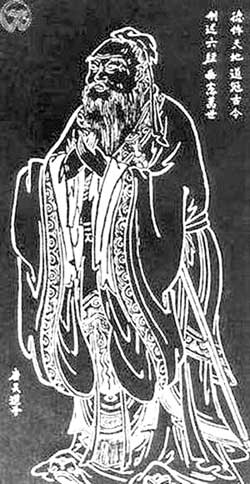- Confucius and Confucianism
- The reception of Confucianism and Neo-Confucianism
- Korean history
- Korean literature

Confucius and Confucianism
A transmitter of Chinese tradition, Confucius also offered his own interpretations of man and society, of their relations, and of things in general. His thought was helpful to contemporary Chinese, who lived in an age of moral and political turmoil. Confucianism is notable for its lack of otherworldliness. The government is the best agency to bring about the ideal society that Confucius believed to have existed in antiquity.
The society that Confucius envisages is an idealized society. People are bound by ethical relations and a set of virtues, with T’ien (Heaven) as the unseen yet purposeful force of nature beyond man’s control. Five basic human relations constitute the foundations for the ideal society: the ruler and the ruled (governed by loyalty), parents and children (governed by filial piety), husband and wife (governed by obedience), elder and younger (governed by respect) and friend and friend (governed by trust).
Always looking back to the pseudo-historical days of Yao and Shun or to the heyday of the Chou dynasty as the model society, Confucius urged the ruler to return to the ancient way or to follow that exemplary age when hereditary kings governed a simple agricultural society not by means of force but through the example of virtue.
In Confucius’ political and social philosophy the so-called “rectification of names” had far-reaching significance. The concept was born of rampant social and intellectual chaos that had perverted semantics. Things instead must conform to the ideal verbal meanings attached to them. Theory, in other words, should correspond to reality. “Let the ruler be a ruler; the subject, a subject; the father, a father; the son, a son,” he said.
This conception, while it was useful for reinvigorating the morals of Confucius’ day and later periods, had a deleterious effect on China’s imperial subjects. The Son of Heaven of the Middle Kingdom, that is, the Chinese king, stipulated that all kings of “barbarian” or peripheral nations, in their intercourse with China should enter into its vassalage, a condition that Confucianism sanctified as international propriety.
In Korea, for example, Silla showed a remarkable freedom from the restraints of this propriety, but when the Confucian gentlemen of the Yi dynasty ruling class, who had lost the dynamic flexibility of Silla, assumed the junior partnership and all the assigned roles that defined Korean-Chinese relations, they behaved like a junior or a vassal. The result was the voluntary servitude of Korea and the arrogant mastery of China.
In the spectrum of Confucian morality the foremost idea is jen (in Korean, in), love or human-heartedness. Loving others can in essence lead to a universal love. Confucian love, however, is minutely regulated and gradated in accordance with one’s social relations to the recipients of that love. One imparts his love through li (in Korean, ye), variously rendered as ceremony, social decorum, propriety or etiquette.
One’s love for one’s father, uncle, first cousin, second cousin, friend or stranger is made artificially different in its outward manifestation. This artificiality of li produced many knotty problems, as during the Yi dynasty, when the outward form of li came to be emphasized as the unique means of ensuring an orderly society. I (in Korean, ui) or righteousness is the second most important virtue that a gentleman ought to possess.
Righteousness is required in all difficult situations, but when it becomes a rigid principle, it can lead to obdurate attitudes or even to the eruption of violence. Human-heartedness must be brought into balance with righteousness. A more useful virtue is shu (in Korean, so), reciprocity, altruism or mutual consideration. It provides the Confucian “golden rule”: “What you do not want done to yourself, do not do to others.”
The more positive aspect of the virtue is chung, loyalty or considerateness to others which expands to chung hsiao. One ought to serve his father as he wishes his son to serve himself. An unloving father, however, cannot expect to enjoy filial piety from his son. Finally, Confucius sets the standard of the sage, or the gentleman, as against the small, or inferior, man, whose action is always motivated by personal “profit.”
In the gentleman’s conduct are embodied the Confucian ideals and virtues in perfect balance. The gentleman is conscious of the will of Heaven. Accordingly he is completely at ease with society and the universe. His development is that of Confucius himself: “At fifteen I set my mind on learning; at thirty I could stand firmly; at forty I had no doubts. At fifty I knew the decrees of Heaven; at sixty I obeyed them.
“At seventy,” says Confucius, “I could follow whatever my heart desired without overstepping the bounds of what was right.”
The reception of Confucianism and Neo-Confucianism in Korea